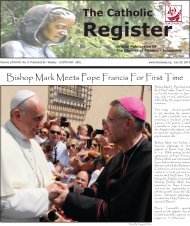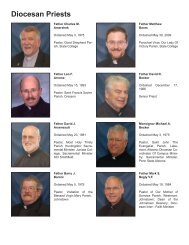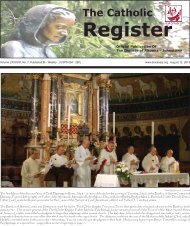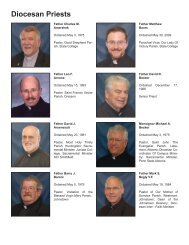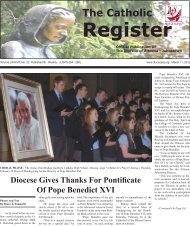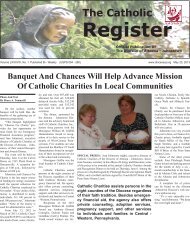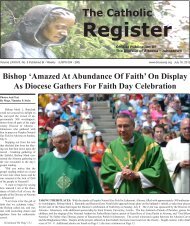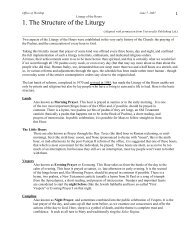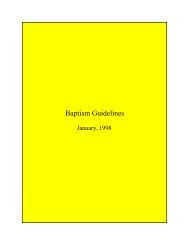encyclical letter deus caritas est of the supreme pontiff benedict xvi ...
encyclical letter deus caritas est of the supreme pontiff benedict xvi ...
encyclical letter deus caritas est of the supreme pontiff benedict xvi ...
Create successful ePaper yourself
Turn your PDF publications into a flip-book with our unique Google optimized e-Paper software.
Christ loved <strong>the</strong>m, when he bent down to wash <strong>the</strong> feet <strong>of</strong> <strong>the</strong> disciples (cf. Jn 13:1-13) and aboveall when he gave his life for us (cf. Jn 13:1, 15:13).The Spirit is also <strong>the</strong> energy which transforms <strong>the</strong> heart <strong>of</strong> <strong>the</strong> ecclesial community, so that itbecomes a witness before <strong>the</strong> world to <strong>the</strong> love <strong>of</strong> <strong>the</strong> Fa<strong>the</strong>r, who wishes to make humanity a singlefamily in his Son. The entire activity <strong>of</strong> <strong>the</strong> Church is an expression <strong>of</strong> a love that seeks <strong>the</strong> integralgood <strong>of</strong> man: it seeks his evangelization through Word and Sacrament, an undertaking that is <strong>of</strong>tenheroic in <strong>the</strong> way it is acted out in history; and it seeks to promote man in <strong>the</strong> various arenas <strong>of</strong> lifeand human activity. Love is <strong>the</strong>refore <strong>the</strong> service that <strong>the</strong> Church carries out in order to attendconstantly to man's sufferings and his needs, including material needs. And this is <strong>the</strong> aspect, thisservice <strong>of</strong> charity, on which I want to focus in <strong>the</strong> second part <strong>of</strong> <strong>the</strong> Encyclical.Charity as a responsibility <strong>of</strong> <strong>the</strong> Church20. Love <strong>of</strong> neighbour, grounded in <strong>the</strong> love <strong>of</strong> God, is first and foremost a responsibility for eachindividual member <strong>of</strong> <strong>the</strong> faithful, but it is also a responsibility for <strong>the</strong> entire ecclesial community atevery level: from <strong>the</strong> local community to <strong>the</strong> particular Church and to <strong>the</strong> Church universal in itsentirety. As a community, <strong>the</strong> Church must practise love. Love thus needs to be organized if it is tobe an ordered service to <strong>the</strong> community. The awareness <strong>of</strong> this responsibility has had a constitutiverelevance in <strong>the</strong> Church from <strong>the</strong> beginning: “All who believed were toge<strong>the</strong>r and had all things incommon; and <strong>the</strong>y sold <strong>the</strong>ir possessions and goods and distributed <strong>the</strong>m to all, as any had need”(Acts 2:44-5). In <strong>the</strong>se words, Saint Luke provides a kind <strong>of</strong> definition <strong>of</strong> <strong>the</strong> Church, whoseconstitutive elements include fidelity to <strong>the</strong> “teaching <strong>of</strong> <strong>the</strong> Apostles”, “communion” (koinonia),“<strong>the</strong> breaking <strong>of</strong> <strong>the</strong> bread” and “prayer” (cf. Acts 2:42). The element <strong>of</strong> “communion” (koinonia) isnot initially defined, but appears concretely in <strong>the</strong> verses quoted above: it consists in <strong>the</strong> fact thatbelievers hold all things in common and that among <strong>the</strong>m, <strong>the</strong>re is no longer any distinctionbetween rich and poor (cf. also Acts 4:32-37). As <strong>the</strong> Church grew, this radical form <strong>of</strong> materialcommunion could not in fact be preserved. But its essential core remained: within <strong>the</strong> community <strong>of</strong>believers <strong>the</strong>re can never be room for a poverty that denies anyone what is needed for a dignifiedlife.21. A decisive step in <strong>the</strong> difficult search for ways <strong>of</strong> putting this fundamental ecclesial principleinto practice is illustrated in <strong>the</strong> choice <strong>of</strong> <strong>the</strong> seven, which marked <strong>the</strong> origin <strong>of</strong> <strong>the</strong> diaconal <strong>of</strong>fice(cf. Acts 6:5-6). In <strong>the</strong> early Church, in fact, with regard to <strong>the</strong> daily distribution to widows, adisparity had arisen between Hebrew speakers and Greek speakers. The Apostles, who had beenentrusted primarily with “prayer” (<strong>the</strong> Eucharist and <strong>the</strong> liturgy) and <strong>the</strong> “ministry <strong>of</strong> <strong>the</strong> word”, feltover-burdened by “serving tables”, so <strong>the</strong>y decided to reserve to <strong>the</strong>mselves <strong>the</strong> principal duty andto designate for <strong>the</strong> o<strong>the</strong>r task, also necessary in <strong>the</strong> Church, a group <strong>of</strong> seven persons. Nor was thisgroup to carry out a purely mechanical work <strong>of</strong> distribution: <strong>the</strong>y were to be men “full <strong>of</strong> <strong>the</strong> Spiritand <strong>of</strong> wisdom” (cf. Acts 6:1-6). In o<strong>the</strong>r words, <strong>the</strong> social service which <strong>the</strong>y were meant toprovide was absolutely concrete, yet at <strong>the</strong> same time it was also a spiritual service; <strong>the</strong>irs was atruly spiritual <strong>of</strong>fice which carried out an essential responsibility <strong>of</strong> <strong>the</strong> Church, namely a wellorderedlove <strong>of</strong> neighbour. With <strong>the</strong> formation <strong>of</strong> this group <strong>of</strong> seven, “diaconia”—<strong>the</strong> ministry <strong>of</strong>charity exercised in a communitarian, orderly way—became part <strong>of</strong> <strong>the</strong> fundamental structure <strong>of</strong> <strong>the</strong>Church.22. As <strong>the</strong> years went by and <strong>the</strong> Church spread fur<strong>the</strong>r afield, <strong>the</strong> exercise <strong>of</strong> charity became<strong>est</strong>ablished as one <strong>of</strong> her essential activities, along with <strong>the</strong> administration <strong>of</strong> <strong>the</strong> sacraments and <strong>the</strong>proclamation <strong>of</strong> <strong>the</strong> word: love for widows and orphans, prisoners, and <strong>the</strong> sick and needy <strong>of</strong> everykind, is as essential to her as <strong>the</strong> ministry <strong>of</strong> <strong>the</strong> sacraments and preaching <strong>of</strong> <strong>the</strong> Gospel. TheChurch cannot neglect <strong>the</strong> service <strong>of</strong> charity any more than she can neglect <strong>the</strong> Sacraments and <strong>the</strong>



